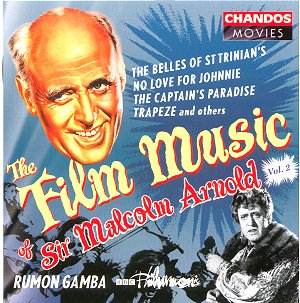Collection The Film Music of Malcolm ARNOLD Vol 2
Suite from Trapeze; Overture: The Roots of Heaven;
Symphonic Study Machines for brass, percussion and strings;
Suite: No Love for Johnny*; Suite: David
Copperfield†; Scherzetto for clarinet and orchestra:
You Know What Sailors Are; Ballad for piano and orchestra:
Stolen Face*; Comedy Suite (Exploits for Orchestra) from
The Belles of St Trinian's†; Fantasy on
Christmas Carols: The Holly and the Ivy; Postcard from the
Med.: The Captain's Paradise*.
* premiere recording † premier recording in this version.
 John Bradbury (clarinet);
Philip Dyson (piano)
John Bradbury (clarinet);
Philip Dyson (piano)
BBC Philharmonic conducted by Rumon
Gamba
 CHANDOS CHAN 9851
[78:55]
CHANDOS CHAN 9851
[78:55]
Crotchet
Amazon
UK

It's been a long time coming, this second volume of Film Music by Sir Malcolm
Arnold, (Volume 1, that included: The Bridge on the River Kwai,
Whistle Down the Wind, and Hobson's Choice, was
released back in 1992), but this latest collection proves that Arnold was
indeed a potent composer in the genre.
The album begins with a suite from Trapeze reconstructed, arranged
and orchestrated by Philip Lane and here I should pause to pay tribute to
the fine work of Lane which has enabled the recording so many of the tracks
on this album. Circus drama, Trapeze (1956) starred Burt Lancaster,
Tony Curtis and Gina Lollobrigida. The Main Titles music sums up all the
dangerous excitement of the high wire with a broad romantic spirit (and some
wit) that reminds one of Steiner. 'Romance' is a slinky, close-up dance which
very well captures the mood of the 1940s/50s. Bullish circus 'Fanfares' are
followed by the amusing lumbering gait of 'Elephant Waltz' while 'Mike and
Lola' is a dreamy romantic interlude. 'Tino's Arrival in Paris' swaggers
along with accordion and rhythmic sticks and the suite draws to a conclusion
in the darker, dramatic Finale.
The Roots of Heaven (1958) was about elephant poaching in Africa.
It starred Trevor Howard and Errol Flynn, and it inspired a bombastic and
colourful score from Arnold with some vivid evocations of elephant trumpetings
plus a little wild jazz and a lovely romantic waltz. Rumon Gamba gives it
a lusty reading.
Arnold's music for the 1951 documentary Report on Steel was turned
into Symphonic Study Machines. It is an energetic and frantically
paced score that pungently captures the sounds of heavy machinery
and the dark smoky atmosphere of the machine shops.
No Love for Johnny (1960) had Peter Finch seduced away from
his duties as an MP by an illicit romance. Philip Lane's reconstruction begins
with a swaggering jubilant march for Johnny's campaign trail that is not
without wit in that one senses false promises. The Moderato movement is for
the romance but the dreamy stuff is juxtapositioned with ominous timpani
rolls suggesting Johnny's career falling apart when he fails to turn up at
the House of Commons.
Another lovely bitter-sweet score (again arranged by Lane), reminding one
of the golden age of Hollywood, came for the 1969 version of David
Copperfield that starred Ralph Richardson, Lawrence Olivier and Michael
Redgrave. It was to be Arnold's last score. 'The Micawbers' is a lively,
witty little scherzo that has the quirky fussiness and gait of a pecking
hen. 'Young Lovers' develops into a lovely waltz that glides and glitters
seductively.
The Scherzetto for clarinet and orchestra from You Know What Sailors
Are is a 2½ minute piece of breezy, cheeky slapstick. It was
arranged by the late Christopher Palmer.
Ballad for Piano and Orchestra from Stolen Face (1952) is a
true find. Written very much in the style of the cinema pianoconcertos of
the period, the excesses of its Late Romanticism are checked by more sinister
material in keeping with the plot development of this early Hammer Horror
about a plastic surgeon (Paul Henreid) who recreates the face of his lost
love (a concert pianist of course) onto an ex-convict (Lizabeth Scott in
a dual role).
But the stand-out track has to be Arnold's brilliantly anarchic and hilarious
music for The Belles of St Trinian's (1954) starring the inimitable
Alistair Sim and George Cole. Arnold wickedly contrasts the sedate 'tea and
crumpet' world of Miss Fritton with the 'ave a banana' crudeness of her criminal
brother Clarence and spiv Flash Harry in very witty music slyly orchestrated.
Gamba and the BBC Philharmonic have great fun with this one. The music was
arranged by Christopher Palmer and edited by Philip Lane
The Holy and the Ivy (1952) is really a collection of Christmas
Carols with the distinctive Arnold touch arranged by Christopher Palmer.
Finally The Captain's Table (1953) has a jaunty tune for the
captain (Alec Guinness) and an infectious dance number for the Captain and
one of his two wives (Yvonne DeCarlo). Another piece of splendid reconstruction
arrangement and orchestration by Lane
A nicely balanced programme of some fine British film music played with energy
and verve.
Ian Lace

